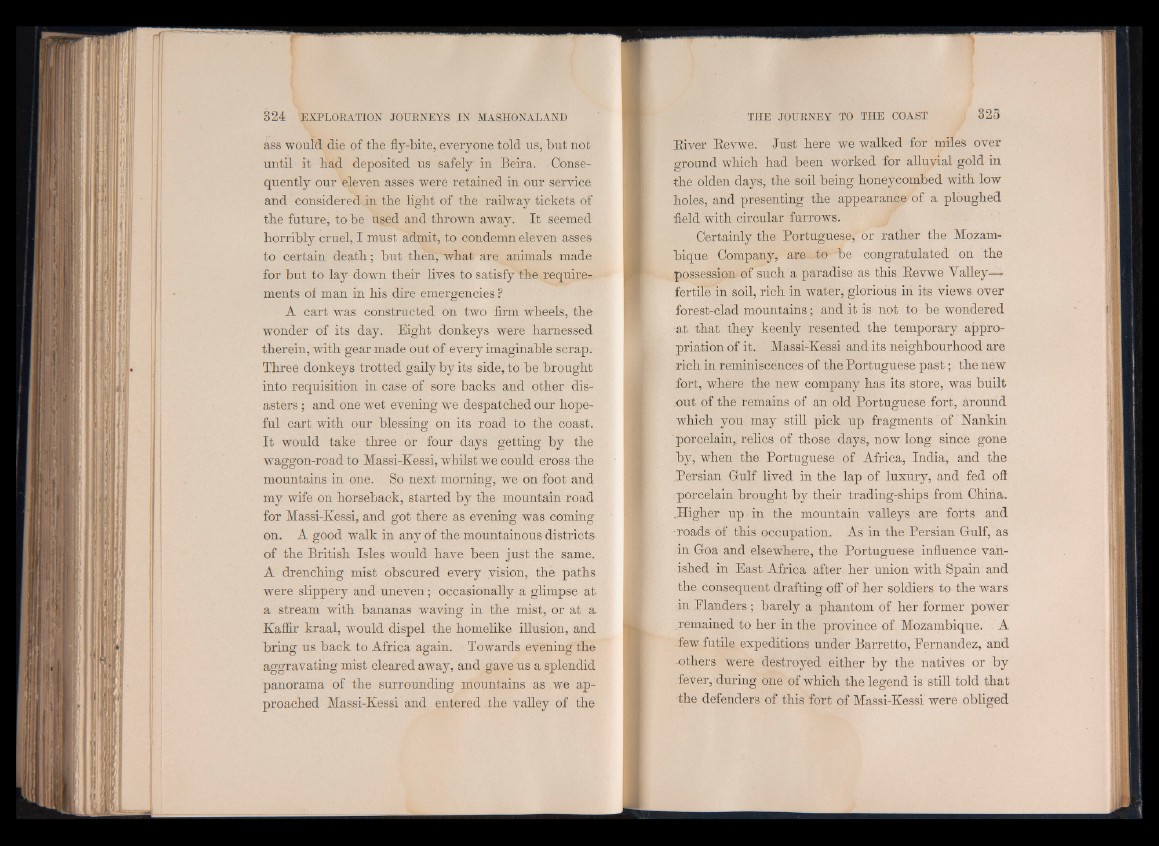
ass would die of the fly-bite, everyone told us, but nob
until it had deposited us safely in Beira. Consequently
our eleven asses were retained in our service
and considered in the light of the railway tickets of
the future, to be used and thrown away. It seemed
horribly cruel, I must admit, to condemn eleven asses
to certain death; but then, what are animals made.
for but to lay down their lives to satisfy the requirements
of man in his dire emergencies ?
A cart was constructed on two firm wheels, the
wonder of its day. Eight donkeys were harnessed
therein, with gear made out of every imaginable scrap.
Three donkeys trotted gaily by its side, to be brought
into requisition in case of sore backs and other disasters
; and one wet evening we despatched our hopeful
cart with our blessing on its road to the coast.
It would take three or four days getting by the
waggon-road to Massi-Kessi, whilst we could cross the
mountains in one. So next morning, we on foot and
my wife on horseback, started by the mountain road
for Massi-Kessi, and got there as evening was coming
on. A good walk in any of the mountainous districts
of the British Isles would have been just the same.
A drenching mist obscured every vision, the paths
were slippery and uneven; occasionally a glimpse at
a stream with bananas waving in the mist, or at a
Kaffir kraal, would dispel the homelike illusion, and
bring us back to Africa again. Towards evening the
aggravating mist cleared away, and gave us a splendid
panorama of the surrounding mountains as we approached
Massi-Kessi and entered , the valley of the
Biver Bevwe. Just here we walked for miles over
ground which had been worked for alluvial gold in
the olden days, the soil being honeycombed with low
holes, and presenting the appearance of a ploughed
field with circular furrows.
Certainly the Portuguese, or rather the Mozambique
Company, are to be congratulated on the
possession of such a paradise as this Bevwe V a lley -
fertile in soil, rich in water, glorious in its views over
forest-clad mountains; and it is not to be wondered
at that they keenly resented the temporary appropriation
of it. Massi-Kessi and its neighbourhood are
rich in reminiscences of the Portuguese p ast; the new
fort, where the new company has its store, was built
out of the remains of an old Portuguese fort, around
which you may still pick up fragments of Nankin
porcelain,; relics of those days, now long since gone
by, when the Portuguese of Africa, India, and the
Persian Gulf lived in the lap of luxury, and fed oft
porcelain brought by their trading-ships from China.
.Higher up in the mountain valleys are forts and
•roads of this occupation. As in the Persian Gulf, as
in Goa and elsewhere, the Portuguese influence vanished
in East Africa after her union with Spain and
the consequent drafting off of her soldiers to the wars
in Flanders ; barely a phantom of her former power
remained to her in the province of Mozambique. A
few futile expeditions under Barretto, Fernandez, and
-others were destroyed either by the natives or by
fever, during one of which the legend is still told that
the defenders of this fort of Massi-Kessi were obliged